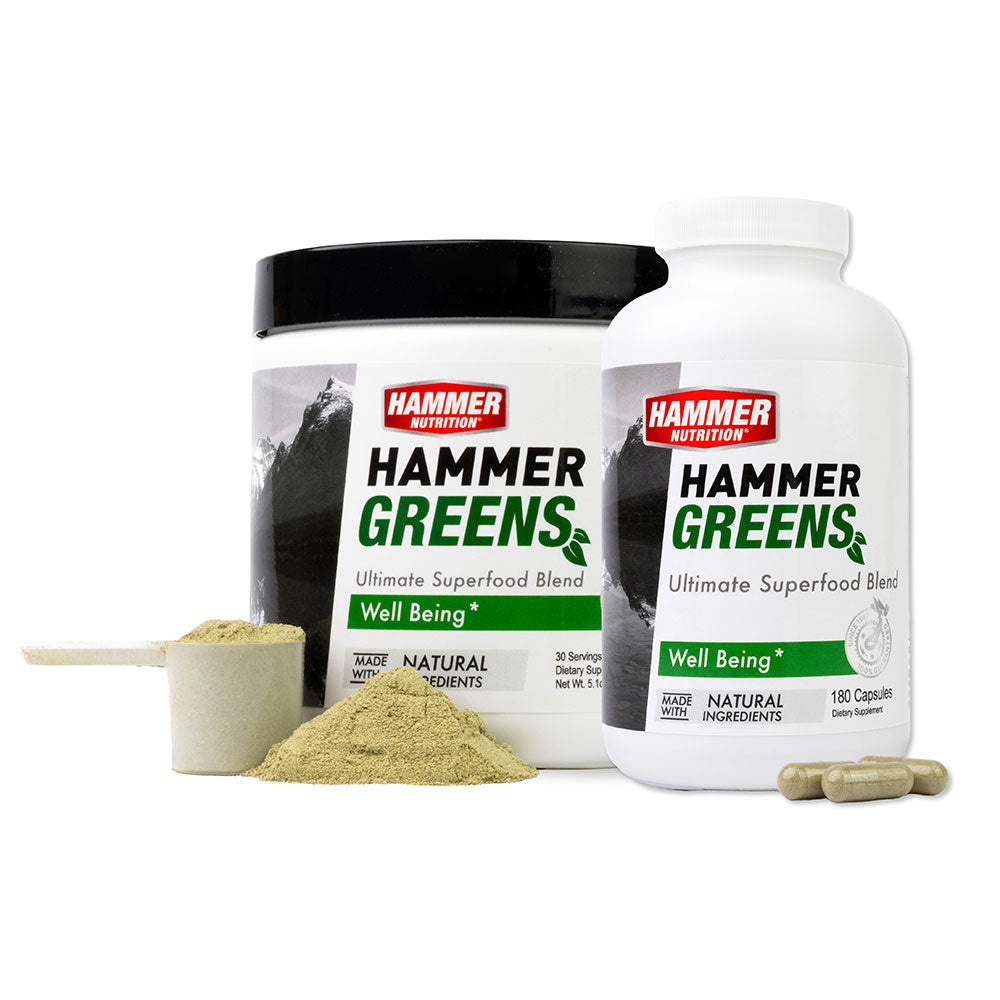
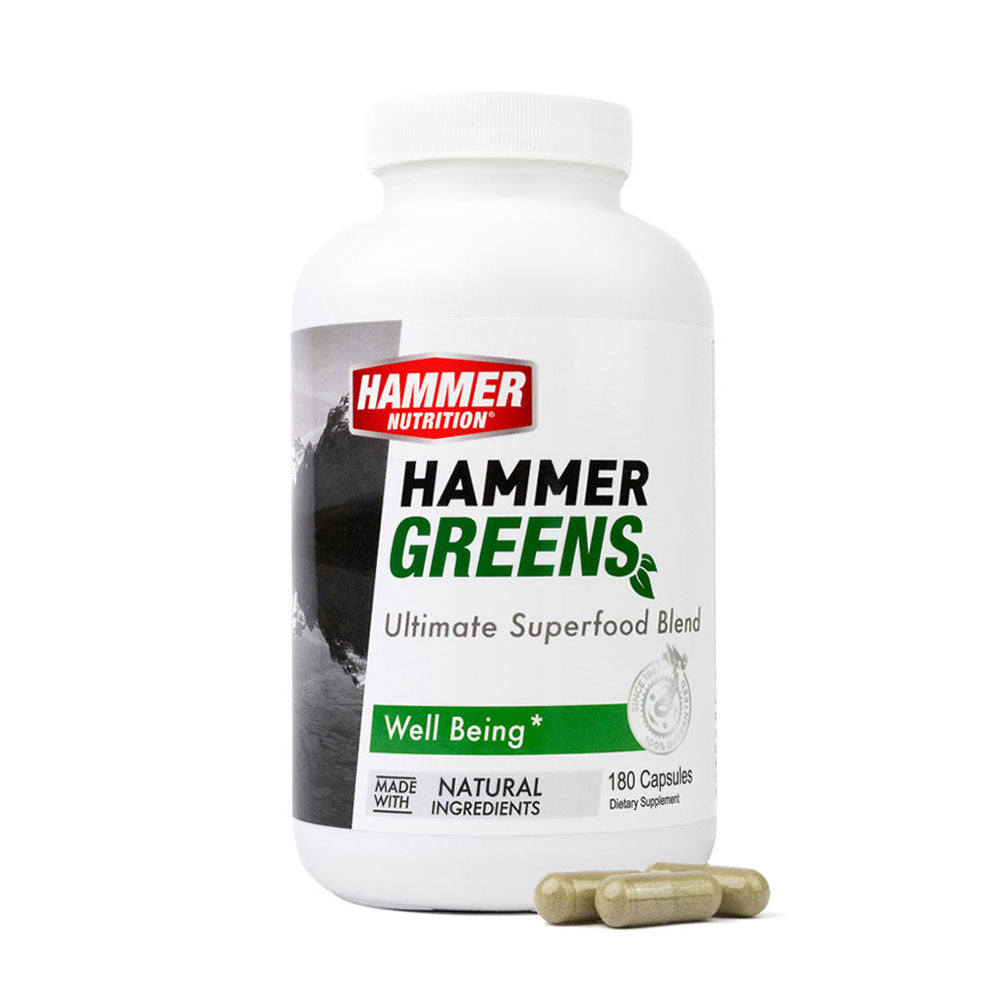
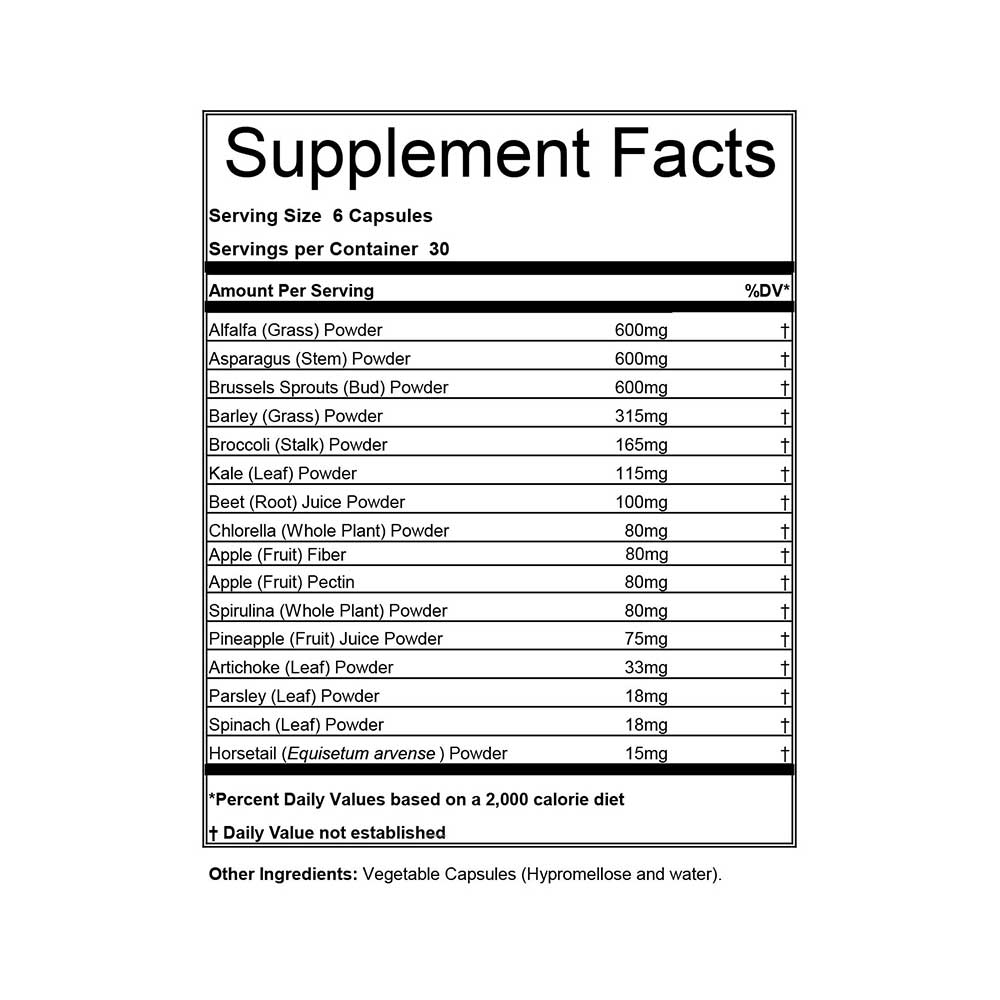
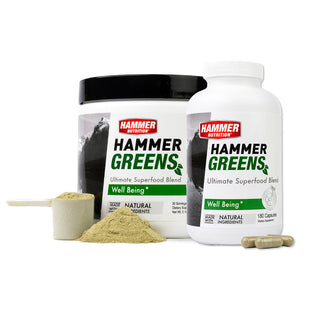
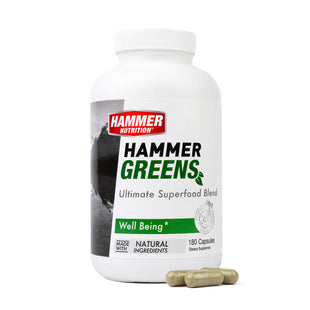
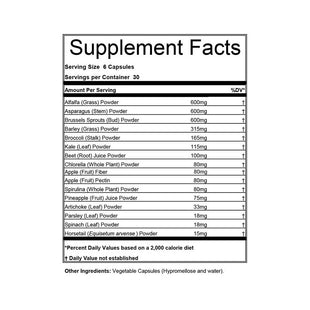

Hammer Greens
Getting your greens has never been easier!
- 16 different fruits, vegetables, herbs, and other “super foods”
- Easy way to get the “green” nutrition you need
- Vitamin- and mineral-rich
- Loaded with numerous health-benefitting compounds
Quantity:




It’s always been a real challenge to provide your body with sufficient amounts of fruits, vegetables, and other healthy compounds it needs to perform optimally and enjoy superior health. Not any longer! While we will always advocate a diet containing whole fruits and vegetables, we understand that this is not always possible. And even if you do consume fruits and vegetables, chances are you’re still not getting enough to truly fulfill your body’s needs. In addition, given how busy we all are on a daily basis, chances are we don’t have enough opportunities to put together a high-quality sit-down meal. That’s precisely where Hammer Greens comes in! Loaded with efficacious amounts of fruits, vegetables, herbs, and other “super foods”, it is the easy way to bolster your daily intake, helping to ensure that your body receives the quality nutrition it craves and needs.
What is the approximate fiber content in a serving of Hammer Greens?
There are approximately 3 grams of fiber per serving.
Is Hammer Greens alkaline or acidic?
A review of all the ingredients in Hammer Greens show that it is not acidic, but rather neutral-pH (7.0) to slightly alkaline.
Are the ingredients in Hammer Greens good for gut health?
Yes, of the 16 ingredients in Hammer Greens, 15 are considered to be prebiotics, which are beneficial for supporting the growth of probiotics (healthy bacteria) in the gut.
Do any of the ingredients in Hammer Greens boost nitric oxide levels?
Yes, of the 16 ingredients in Hammer Greens, 12 help boost nitric oxide (NO) levels in the body, either through being a nitrate-rich food source (nitrates convert to NO in the body), or being a good source of arginine (this amino acid is a precursor to nitric oxide (NO) production in the body). Nitric oxide boosts offer several health benefits, primarily due to its role in promoting healthy blood flow and oxygen delivery.
Are Hammer Greens Organic?
While the formula is not certified organic, all ingredients are sourced through trusted U.S.-based distributors who provide full Certificates of Analysis (COAs) for each component. These COAs include microbiological and heavy metal testing. All raw materials are subject to strict USDA quality controls, and each supplier is vetted for compliance with food safety and regulatory standards. The finished product also undergoes third-party testing for microbial safety (Salmonella, E. coli, and APC).
Capsules: Take 6 capsules with meals.
Powder: Take 5g with 8oz of water or desired liquid daily, with meals.
Alfalfa Grass Powder - A good source of vitamin K and other vitamins and minerals, as well as many other health-benefitting compounds (e.g., saponins, coumarins, flavonoids, phytosterols, and more), alfalfa also possesses powerful antioxidant properties.
Apple Fiber - Apples contain both soluble and insoluble fiber, both of which support gut health and more. Soluble fibers dissolve in water and form a gel-like substance, which helps slow digestion.Soluble fibers also Insoluble fibers don’t dissolve in water, but instead add bulk to stool.
Apple Pectin - This is a soluble fiber extracted from apple peels. Apple pectin supports healthy digestion and overall gut health by acting as a prebiotic, and also via its potential to bind to heavy metals in the GI tract.
Asparagus Powder - High in quercetin, a flavonoid that has antioxidant and anti-inflammatory properties. Asparagus is a good source of other antioxidants such as vitamins A, C, E, and K, and various antioxidant polyphenols (gallic acid, chlorogenic acid, coumaric acid, and ferulic acid). Asparagus is an excellent source of fiber.
Barley Grass Powder - Insoluble fiber content. Barley grass contains a plethora of health-benefiting forms of polyphenols, far too many to list here, and it is a good source of vitamins C and K, and a variety of amino acids.
Beet Juice Powder - Arguably the best-known source of nitrates, which the body converts to nitric oxide (NO). Beet juice contains a type of polyphenol called betalains, which have an impressive array of beneficial properties, such as antioxidants.
Broccoli Juice Powder - Among many other health-benefiting compounds, broccoli juice contains high amounts of glucoraphanin, which is converted into sulforaphane, whose benefits are numerous and wide-ranging: Broccoli juice also contains lutein and zeaxanthin, antioxidants.
Brussels Sprout Powder - Its main bioactive compounds are glucosinolates, which are broken down to produce isothiocyanates. Brussels sprouts powder is also a good source of vitamins C, K, and folate (B9), along with multiple carotenoids (beta-carotene, lutein, zeaxanthin).
Chlorella - A single-celled, green freshwater algae, chlorella is perhaps the most vitamin- and mineral-dense “green food” there is, which includes a complete B vitamin profile. Chlorella also contains naturally occurring RNA and DNA plus plentiful amounts of beta-carotene and lutein.
Horsetail Leaf - A rich plant-based source of the trace mineral silica that helps form the building blocks of collagen, horsetail leaf has benefits for skin, hair, bones, nails, and more. This fern-like plant also contains many health-benefiting compounds including flavonoids, phenolic acids, phytosterols and many more.
Artichoke Powder - Arguably the most potent fruit or vegetable there is, artichokes are loaded with multiple compounds that benefit many areas of health.
Kale Leaf - Rich in polyphenols and flavonoids–especially quercetin and kaempferol–and other antioxidant compounds, kale leaf is an excellent source of beta-carotene, vitamin C, and vitamin K. Like beet juice powder, kale leaf contains high amounts of nitrates, which the body converts to NO.
Parsley Leaf - Another plant that is loaded with antioxidant compounds, in particular myricetin and apigenin.
Pineapple Fruit Powder - In addition to the many nutrients and health-benefiting flavonoids and phenolic compounds found in pineapples, this fruit also contains bromelain, a digestive enzyme that helps break down protein and aid digestion, while also having strong recovery properties.
Spinach Leaf - An extremely nutrient-rich vegetable, spinach is an excellent source of vitamin C, vitamin K, folate (B9), iron and calcium. Spinach also contains the compounds lutein and zeaxanthin, and it is another nitrate-containing food, so it helps boost nitric oxide (NO) levels in the body.
Spirulina Powder - Considered by many to be THE superfood of superfoods, spirulina is vitamin- and mineral-dense, and rich in enzymes and antioxidants such as superoxide dismutase (SOD). It is an excellent source of chlorophyll and essential fatty acids, also phycocyanin content. Additionally, spirulina is believed to help maintain digestive system health by serving as a food/fuel source for beneficial intestinal flora.
|
Supplement Facts |
||
|---|---|---|
| Serving Size: 6 Capsules Servings Per Container: 30 |
||
| Amount Per Serving | % Daily Value* | |
| Alfalfa (Grass) Powder | 600mg | † |
| Asparagus (Stem) Powder | 600mg | † |
| Brussel Sprouts (Bud) Powder | 600mg | † |
| Barley (Grass) Powder | 315mg | † |
| Broccoli (Stalk) Powder | 165mg | † |
| Kale (Leaf) Powder | 115mg | † |
| Beet (Root) Juice Powder | 100mg | † |
| Chlorella (Whole Plant) Powder | 80mg | † |
| Apple (Fruit) Fiber | 80mg | † |
| Apple (Fruit) Pectin | 80mg | † |
| Spirulina (Whole Plant) Powder | 80mg | † |
| Pineapple (Fruit) Juice Powder | 75mg | † |
| Artichoke (Leaf) Powder | 33mg | † |
| Parsley (Leaf) Powder | 18mg | † |
| Spinach (Leaf) Powder | 18mg | † |
| Horsetail (Equisetum arvense) Powder | 15mg | † |
| * The Percent Daily Values are based on a 2,000 calorie diet. † Daily Value not established. Other Ingredients: Vegetable Capsules (Hypromellose and water). These statements have not been evaluated by the Food and Drug Administration. This product is not intended to diagnose, treat, cure or prevent any disease. |
||
|
Supplement Facts |
||
|---|---|---|
| Serving Size: 5g / 1 packet | ||
| Amount Per Serving | % Daily Value* | |
| Alfalfa Grass Powder | 800mg | † |
| Apple Fiber | 110mg | † |
| Apple Pectin | 110mg | † |
| Asparagus Powder | 800mg | † |
| Barley Grass Powder | 800mg | † |
| Beet Juice Powder | 135mg | † |
| Broccoli Juice Powder | 225mg | † |
| Brussel Sprout Powder | 800mg | † |
| Chlorella | 110mg | † |
| Horsetail Grass | 21.25mg | † |
| Artichoke Powder | 45mg | † |
| Kale Leaf Powder | 158.75mg | † |
| Parsley Leaf Powder | 25mg | † |
| Pineapple Powder | 100mg | † |
| Spinach Powder | 25mg | † |
| Spirulina Powder | 110mg | † |
| * The Percent Daily Values are based on a 2,000 calorie diet. † Daily Value not established. Other Ingredients: Monk Fruit and Maltodextrin These statements have not been evaluated by the Food and Drug Administration. This product is not intended to diagnose, treat, cure or prevent any disease. |
||








